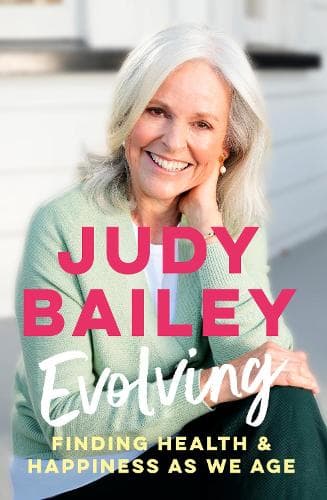Review — Evolving: Finding health and happiness as we age by Judy Bailey
Reviewed by Catherine Milford
Mother of the nation, journalist, news anchor, television presenter and author Judy Bailey is getting older. Now in her seventies, the beloved national treasure is once again writing about what she knows, and in Evolving, she takes a deep dive into an area that affects all of us, if we’re lucky – ageing and retirement.
Judy has garnered the latest information from New Zealand academics and medical specialists from nutrition and exercise right through to superannuation, working post-65 and other options for anyone approaching retirement to provide an innovative and insightful read on what can be a tricky time of life.
There’s a school of thought that our later years are often spent in declining health, with little to do, say or contribute. Judy turns that idea on its head, suggesting that ‘our sense of happiness and wellbeing – no matter where in the world we are – tends to follow a U-shaped curve. In other words, we are happiest at the beginning and end of our lives’. (p14)
Some aspects of the book are likely to be common knowledge in part; although a reminder is always welcome, most of us know, for instance, that keeping mind and body active, and eating the correct types and amounts of nutrients to stay healthy. However, there’s also plenty to evoke deep thought. Finances, our mental and physical health, how we’ll cope spending much more time with our husbands or wives – or on our own - and where we’ll end up living are worries many have.
The chapter on money is eye-opening. Retirement can be expensive – if you’re lucky, that means enjoying the odd cruise, or taking some time to explore the world, but many of us are likely to have financial worries way closer to home. Appliances aren’t built to last these days, and the need for medical help is all but inevitable; we’re also trying to help the kids find their way, and many of us want to use what we have to enable the next generation to buy their own homes.
However, as Judy says, there’s no ‘magic line in the sand’ that stops us doing what we want once we hit 65. She cites many cases throughout the book on people who have eschewed ‘the norm’, continuing to work, taking up study or even embarking on whole new careers. While Judy is pragmatic about the issues we face, she’s also discovered plenty of real-life cases of reinvention and reinvigoration that will inspire many who are thinking ‘what on earth will I do next?’
As well as inspiration, there’s plenty of useful practical advice. Knowing how to arrange a funeral, spot a scammer, write a will, create a trust, or deal with loneliness are relatable topics for all adults. It’s a very good idea not to wait until you’re over 65 to get your paperwork in order; if that seems like a lot to deal with, the quiet practicality of Evolving is a good place to start.
Judy shares plenty of her own thoughts and ideas, but for me, the best aspect of this book is the running thread that getting older doesn’t have to mean becoming invisible and irrelevant. Living life to the full, and dealing with issues through knowledge is the message of this book. It seems pertinent to quote 80-year-old Tess, who tells Judy, “I’m becoming bolder, learning that every day is a gift. We can do anything we like.” (p.290)
Reviewed by Catherine Milford
